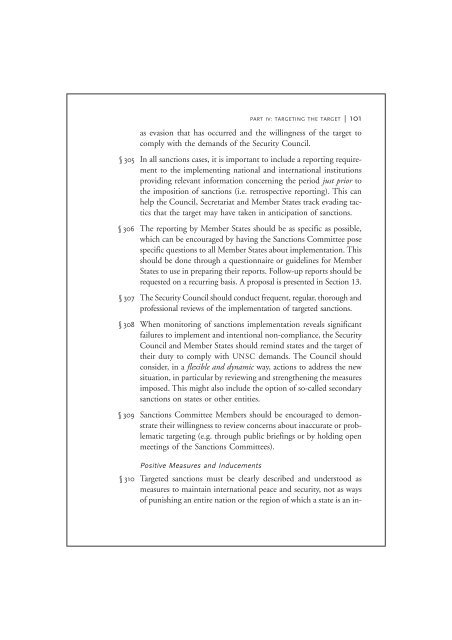Making Targeted Sanctions Effective - Small Arms Survey
Making Targeted Sanctions Effective - Small Arms Survey
Making Targeted Sanctions Effective - Small Arms Survey
You also want an ePaper? Increase the reach of your titles
YUMPU automatically turns print PDFs into web optimized ePapers that Google loves.
§ 305<br />
§ 306<br />
§ 307<br />
§ 308<br />
§ 309<br />
§ 310<br />
PART IV: TARGETING THE TARGET | 101<br />
as evasion that has occurred and the willingness of the target to<br />
comply with the demands of the Security Council.<br />
In all sanctions cases, it is important to include a reporting requirement<br />
to the implementing national and international institutions<br />
providing relevant information concerning the period just prior to<br />
the imposition of sanctions (i.e. retrospective reporting). This can<br />
help the Council, Secretariat and Member States track evading tactics<br />
that the target may have taken in anticipation of sanctions.<br />
The reporting by Member States should be as specific as possible,<br />
which can be encouraged by having the <strong>Sanctions</strong> Committee pose<br />
specific questions to all Member States about implementation. This<br />
should be done through a questionnaire or guidelines for Member<br />
States to use in preparing their reports. Follow-up reports should be<br />
requested on a recurring basis. A proposal is presented in Section 13.<br />
The Security Council should conduct frequent, regular, thorough and<br />
professional reviews of the implementation of targeted sanctions.<br />
When monitoring of sanctions implementation reveals significant<br />
failures to implement and intentional non-compliance, the Security<br />
Council and Member States should remind states and the target of<br />
their duty to comply with UNSC demands. The Council should<br />
consider, in a flexible and dynamic way, actions to address the new<br />
situation, in particular by reviewing and strengthening the measures<br />
imposed. This might also include the option of so-called secondary<br />
sanctions on states or other entities.<br />
<strong>Sanctions</strong> Committee Members should be encouraged to demonstrate<br />
their willingness to review concerns about inaccurate or problematic<br />
targeting (e.g. through public briefings or by holding open<br />
meetings of the <strong>Sanctions</strong> Committees).<br />
Positive Measures and Inducements<br />
<strong>Targeted</strong> sanctions must be clearly described and understood as<br />
measures to maintain international peace and security, not as ways<br />
of punishing an entire nation or the region of which a state is an in-
















